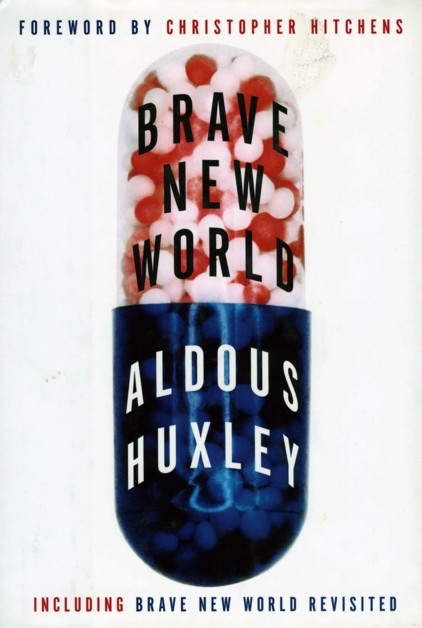 There’s a saying, usually attributed to Truffaut, that it’s impossible to make an anti-war film. You can ply the audience with sad violins and depressing “war is hell” monologues all you want, but as soon as the action scenes start the viewer’s lizard brain takes over. “Yeah, scrag those bastards! Semper fi!”
There’s a saying, usually attributed to Truffaut, that it’s impossible to make an anti-war film. You can ply the audience with sad violins and depressing “war is hell” monologues all you want, but as soon as the action scenes start the viewer’s lizard brain takes over. “Yeah, scrag those bastards! Semper fi!”
Aldous Huxley likewise attempts the impossible – he wants us to hate paradise. In this book (set 500 years in the future), society has advanced to unimaginable levels of human development. Everyone is young, healthy, and beautiful. Your days are spent relaxing and stimulating the pleasure centers at ear, mouth, and groin. Even the lower classes seem to have made out well. And there’s a drug that provides raw, undiluted pleasure to your brain, in case you want to cut out the middle man.
Brave New World is a distaff counterpart to 1984. Its central thesis: “what if Big Brother kept control of society by loving people to death? What if it took away your free will simply by making you too happy to care? Wouldn’t that be equally hellish?”
No, actually, it wouldn’t be equally hellish. Brave New World’s supposed dystopia sounds like a wonderful place to live, and the when the hero rebels against the system you want to slap him for being a idiot. Roger Ebert once said something like “it’s hard to cheer for the hero when the villain is the one making sense.” Likewise, it’s hard to call something a “dystopia” when you’d trade your present life for it in a heartbeat. The characters in this book (chiefly John and Bernard) will leave you gobsmacked by their audacity. Yes, hedonism isn’t everything, and it’s possible that I’d be just as unfulfilled as them in the World State. The point is, I’d sure love the opportunity to find out.
Some parts of Aldous’s future society seem discomforting to the modern reader, such as the sexualisation of children. And I think a true paradise would be one in which people can fulfill their individual preferences, rather than just drowning the brain in dopamine and serotonin. But Brave New World fails at what it attempts. A paradise wrapped up in a “THIS IS HELL” box is still a paradise. All the characters’ acts of rebellion seem false and contrived – like the torturous gimp logic you’d need to throw away a winning lottery ticket.
This is the same problem I have with a lot of rock and roll memoirs. All of them follow an obligatory arc, massive success, then a crash down into drugs and depression where we’re supposed to pity them and reflect that wealth doesn’t bring happiness. It just makes me roll my eyes and say “give me a break.” Yes, I’m sure Nikki Sixx gets sad sometimes. But still, you just can’t feel too sorry for a millionaire rockstar living in a mansion.
Maybe this wasn’t an impossible venture. Maybe Huxley could have made me hate this society. But it wouldn’t be by making it a paradise, it would be by making it a more ambiguous futuristic society, like the one in Vernes’ Paris in the 20th Century, that has many good things, but also lot of unexpected emergent problems.
It would be a place like modern South Korea, a technological Aladdin’s Cave that has the second highest suicide rate in the world. There’s things to be said there, about how pursuing progress for the good of the people inevitably leads to pursuing progress for the sake of hitting quotas and metrics, the people forgotten. You’d talk about Schelling points and positive feedback cycles and all the other ways the war can be lost even when every battle has been won.
But it stands, Brave New World is just a statement of “I’ve read 1984, and you know what would be even more awful? If MiniLuv was really about love!“
No Comments »
Comments are moderated and may take up to 24 hours to appear.
No comments yet.
